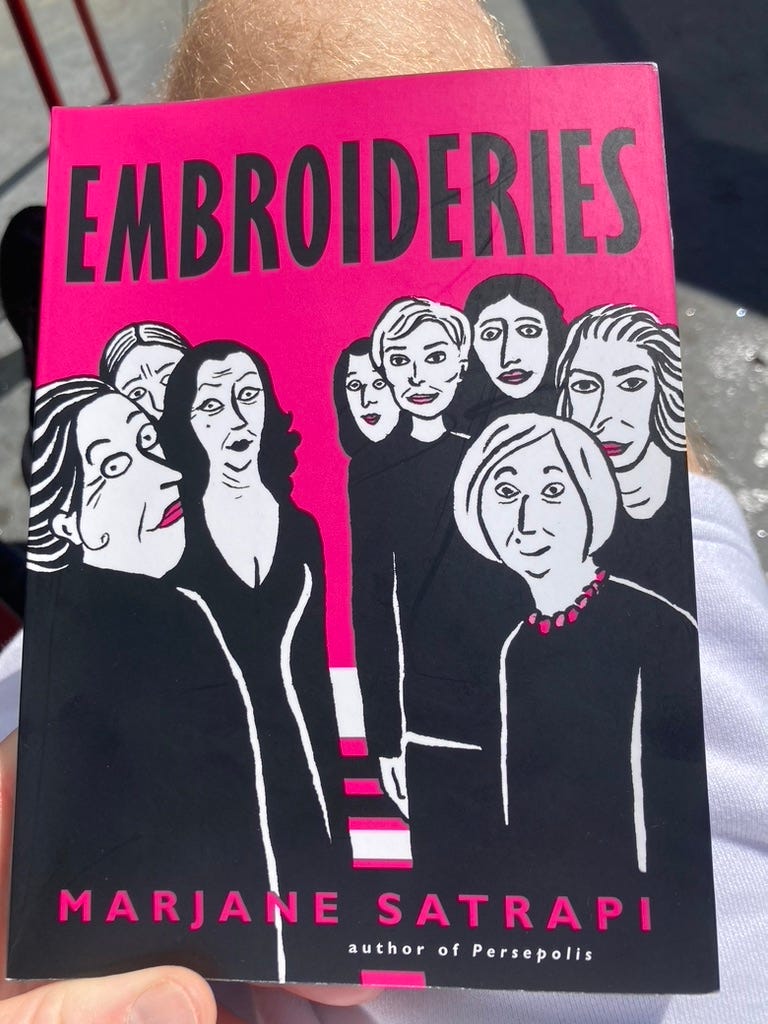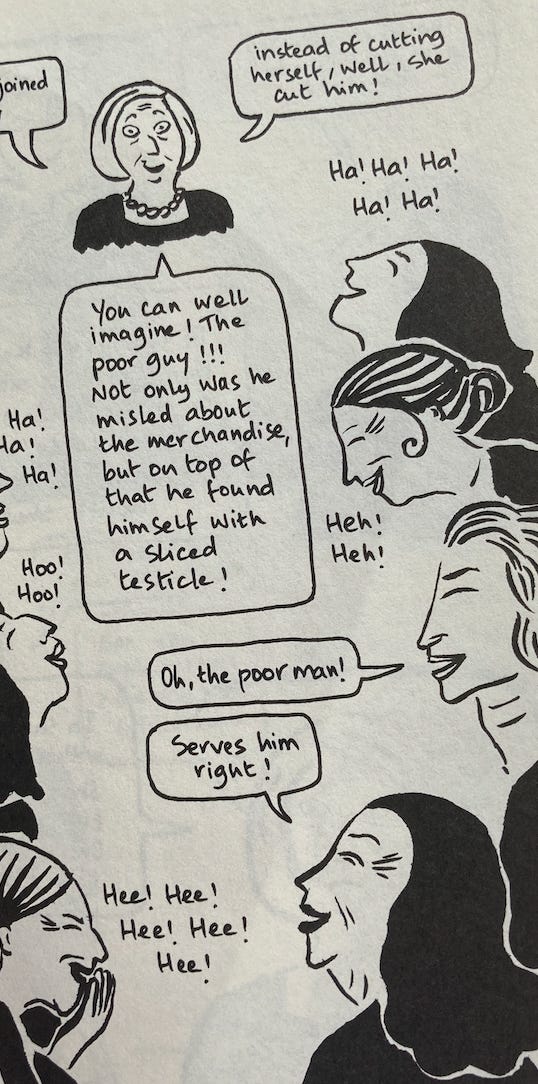EMBROIDERIES - Serio Comics 6
EMBROIDERIES written & drawn by Marjane Satrapi published by Pantheon Books and Penguin Random House and L'Association, translated from the French by Anjali Singh
OK, I mentioned back on February 23rd, when I did Seriocomics 5 about
IT'S LIFE AS I SEE IT: Black Cartoonists in Chicago, 1940 - 1980 compiled & edited by Dan Nadel, published by New York Review Comics & Museum of Contemporary Art Chicago
That I’d likely be missing some time in order to write a new parody Haggadah
Well, that book was written and had an impact of sorts and we’re ready to get back to a more regular cadence of enthusiasms for works of graphic literature that are partly serious and partly comic
This next one was sort of requested by a reader of the Substack
Which, yes, inspires me to offer the same opportunity for any of you to request a work of graphic literature to be enthused about
Don’t worry at this point in my aesthetic judgment journey I can find something to like about anything (though please don’t actively try to prove me wrong lol)
So feel free to leave a comment with a request
This week’s enthusiasm is for Marjane Satrapi’s follow-up to her acclaimed two-book PERSEPOLIS series
Which was an autobiographical series of bandes dessinées (French comics) published in America in 2003 & 2004 and named after the ancient capital of the Persian Empire, which depicts Satrapi’s childhood up to her early adult years in Iran during and after the Islamic Revolution as well as her cultural exposure to Western ideas in Europe
Her lessons from immigration/expatriation are perhaps best described by the phrase at the end of the second book: “Freedom has a price”
It was also adapted by Satrapi and the French artist, Winshluss, into an animated film for Sony Pictures Classics in 2007 that received numerous awards including the Jury Prize at the 2007 Cannes Film Festival as well as an Academy Award nomination for Best Animated Feature
Hint hint, graphic novels make great film adaptations ;)
This follow-up, EMBROIDERIES, was published in America in 2005

And it is a much more distilled work than its predecessors at 144 pages
Yet it also has similar themes about costs and freedom
But this is costs and freedom more so in the domestic sphere of love/marriage than the societal sphere of politics/religion
The conceit is that the Marji character recalls her days having tea with her female relatives after their husbands retire to nap after meals
At these tea parties, the women ‘ventilate their hearts’ with stories about their own lives and of other women around them
One of the striking things about EMBROIDERIES is that even though the tone of the stories can be quite comedic
Ribaldly so
The ramifications of the stories are quite serious for the people who lived them
Pathosly so
But Marji has the potential to learn from them and is the stand-in for the reader who can also learn from them, even if there is no one ‘answer’
The subject reminded me of recent scientific research into the benefits of gossip
Here’s a screenshot from an article by The Proceedings of the National Academy of Sciences (PNAS), a peer reviewed journal of the National Academy of Sciences (NAS):
We’re often only aware of a contemporary meaning of a word
For instance, gossip is currently defined by the Oxford English Dictionary in our Mac Pros as:
Yet if you look back at the etymology of the word, you can see not just the roots of its origin but also implications for its utility:
As you can see from Satrapi’s story, which depicts the nine women who helped raise her, these female ‘godsibbs’ instruct her through their own experiences on how to best make her way in the world
And if you think even further back in the etymology of the word gossip, it would likely go back to the word gospel
Which again gets a very limited definition from the OED:
But a deeper understanding of its etymology shows that it might mean a ‘good spell’ or a ‘good story’ or a ‘god story’
In the way that the form of memoir is often considered more feminine than the form of history, a gospel account from men about other men and women is considered more ordered or positive, while a gossip account from women about themselves, as well as other women and men, is considered more chaotic or negative
But as Carl Jung said about love: its opposite is not indifference, it’s power
And the same is likely true of history: the opposite of its power, is difference
What was perhaps most rewarding was seeing that even after serious reputation marring situations, the characters are able to find the lightness that can result:
Further, they don’t really outcast/ostracize or completely judge/cancel anyone in their ‘gossip’ narratives, because they seem to know they could be the victim or perhaps even the perpetrator in someone else’s account of their own life
EMBROIDERIES is available from bookstores and libraries at Goodreads locally in LA at Skylight, from other local stores at Bookshop.org, and from Amazon
Thanks for standing by waiting for more Seriocomics as I wrote and published and marketed a book … you can buy the parody Haggadah here!
The graphic novel, SHOULD WE um BUY A GUN?, continues to come along slowly but well, and I was reminded of the husband of the couple’s sister characters venting about contemporary issues of power as I reflected on Marji’s godsibbs
Okay, that’s the sixth Seriocomics!
























